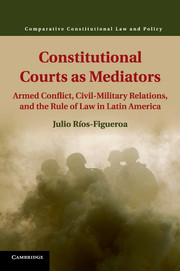 Constitutional Courts as Mediators
Constitutional Courts as Mediators Book contents
- Frontmatter
- Dedication
- Contents
- List of Figures
- List of Tables
- Acknowledgments
- 1 Constitutional Courts and the Armed Forces
- 2 A Theory of Constitutional Courts as Mediators
- 3 Constitutional Jurisprudence on Military Autonomy in Colombia, 1958–2013
- 4 Constitutional Jurisprudence on Military Autonomy in Peru, 1979–2013
- 5 Constitutional Jurisprudence on Military Autonomy in Mexico, 1917–2013
- 6 Judicial Regulation of the Use of Force in Colombia, Peru, and Mexico
- 7 Constitutional Courts as Mediators beyond Latin America
- 8 Constitutional Courts and Democratic Confl ict Solving
- References
- Index
7 - Constitutional Courts as Mediators beyond Latin America
Published online by Cambridge University Press: 05 May 2016
- Frontmatter
- Dedication
- Contents
- List of Figures
- List of Tables
- Acknowledgments
- 1 Constitutional Courts and the Armed Forces
- 2 A Theory of Constitutional Courts as Mediators
- 3 Constitutional Jurisprudence on Military Autonomy in Colombia, 1958–2013
- 4 Constitutional Jurisprudence on Military Autonomy in Peru, 1979–2013
- 5 Constitutional Jurisprudence on Military Autonomy in Mexico, 1917–2013
- 6 Judicial Regulation of the Use of Force in Colombia, Peru, and Mexico
- 7 Constitutional Courts as Mediators beyond Latin America
- 8 Constitutional Courts and Democratic Confl ict Solving
- References
- Index
Summary
A full comparative test of the theory developed in this book would require a mixture of large-N research and case studies, together with detailed information on constitutional jurisprudence on military autonomy as well as the levels of independence, access, powers of review, and composition of constitutional courts in many countries over several years. The aim of this chapter is more limited. The aim is to identify democracies where the armed forces are dealing with internal security challenges and then to examine the constitutional court's involvement in this issue area. Given judicial independence, when the levels of access and powers of review of the court increase does the constitutional jurisprudence on military autonomy come close to the mediator style? Given judicial independence, if levels of access and powers of review are relatively low does the constitutional jurisprudence on military autonomy near the arbitrator style? If the court lacks independence, does jurisprudence reflect the interests of the regime?
I examine three countries where, at different times, democratically elected governments call on the armed forces to face security challenges: Israel since 1948, Turkey since 1961, and Pakistan since 1973. We therefore have two countries from common law and one from civil law traditions, each from different regions of the world. In all three countries, I argue that the Theory of Constitutional Courts as Mediators helps us explain why we observe mediator-style jurisprudence in some places – Israel since 2000 – and not others, Pakistan and Turkey. In a nutshell, an increment of access and powers of judicial review in Israel during the 1990s had a positive impact (in the mediator metaphorical sense) on the way in which the High Court became involved in the security issues surrounding the performance of the Israeli Defense Forces in the occupied territories, whereas a decrease in independence, access, and powers of review of the Turkish Constitutional Court in 1982 also had an effect, but in the opposite direction. In Pakistan, in contrast, persistent lack of judicial independence in the Supreme Court is clearly reflected in constitutional jurisprudence on military autonomy and the overwhelming role of the Pakistani armed forces in the politics of the country.
- Type
- Chapter
- Information
- Constitutional Courts as MediatorsArmed Conflict, Civil-Military Relations, and the Rule of Law in Latin America, pp. 178 - 199Publisher: Cambridge University PressPrint publication year: 2016
